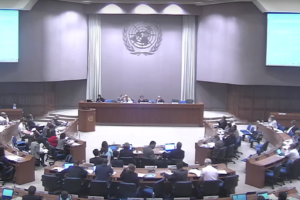MARSEILLE, France (14 March 2012)—Water justice campaigners and private water operators argued the merits of public and private water provision in a debate titled “Private/Public Involvement in the Provision of Water and Sanitation Services,” held 13 March during the 6th World Water Forum in Marseille, France.
Arguing for public control were Maria Theresa Lauron of IBON International/Water for the People Network, and David Boys of Public Services International. On the side of private management were Gerard Payen, president of the International Federation of Private Water Operators (AQUAFED), and Mamadou Dia of Sénégalaise des Eaux.
Boys noted that support for public instead of private management of water and sanitation services has given way to “low risks and high returns.” These returns include socio-cultural aspects not taken into account by market mechanisms such as health, family stability, and community coherence.
Lauron talked about the continuing ill-effects of the water privatization in Metropolitan Manila (the Philippines’ capital region), which is touted by the World Bank as a model of public-private partnerships.
She said that water rates in the Philippines have risen by over 1000% since privatization began in the 1990s, and are now among Asia’s highest. There are still more than 200 “waterless” communities in Metro Manila not serviced because private contractors did not think they were financially viable.
On the other side of the panel, Payen stated that the debate should not be about private participation versus public involvement but being able to guarantee the best solutions to bring water to the other 40% of the global population being served by neither.
As the AQUAFED president was delivering his presentation, some water justice activists in the audience put on red clown noses to drive the message that the World Water Forum is one big corporate fair.
Meanwhil, Dia expounded on the case of Senegal, illustrating how partnership with the private sector has led to reforms in the water sector, promoting democratic participation and sustainability in his country.
The debate highlighted the inherent contradiction between private and public participation in the water sector, indicating the urgent need for consensus on more important issues including governance issues in managing water resources.
Meanwhile, water justice activists gathered at the Alternative World Water Forum that took place from 14-16 March at Docks des Suds Water also sent the message that reclaiming public water and upholding the human right to water are the real solutions to the water crisis. Water is a common good that should not be governed by the logic of profit maximization that is best exemplified by private corporations, they said.
[Snippets of the debate as well as other interviews during the official and alternative water forums are featured in this video by Barcelona-based independent TV channel LaTele (LaTele.cat)]



